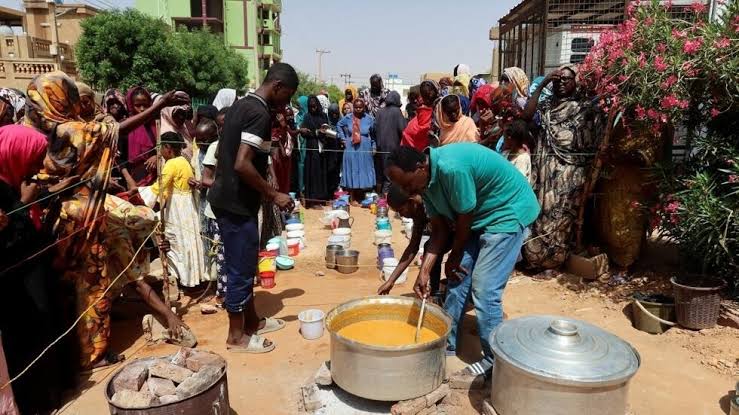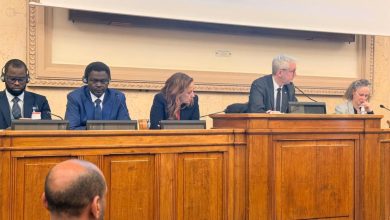Reports
The Halting of Kitchens and Charities: Hunger is More Devastating than Bullets

Sudan Events – Agencies
In mid-August, the Shambat Lands Resistance Committees reported that armed individuals affiliated with the Rapid Support Forces (RSF), who have controlled Bahri since the outbreak of the war, looted food supplies designated for communal kitchens in Shambat. The attackers also assaulted volunteers with direct live fire and stole their personal phones, leading to the cessation of charity kitchens’ operations. The committees denied the presence of any forces protecting civilians or supporting the kitchens, as rumored. These kitchens primarily offer soup, and occasionally bread when available. The meals typically consist of beans, lentils, pasta, beans, and sometimes purslane, spinach, or okra.
“Something Out of Nothing” Weeks after the April 15 war broke out between the army and the RSF in Khartoum, Sudanese people established communal kitchens and charities to fill the void left by state institutions in preventing hunger. Even when there was no money, these grassroots solidarity structures managed to “create something out of nothing,” saving people from the scourge of hunger. But how can these support structures withstand the “state of emergency” that is no longer temporary? Communal kitchens in various parts of Sudan face constant threats of closure. It has become common for kitchens in East Nile, South Belt, or Bahri city to send urgent appeals for support. Similarly, communal kitchens established in shelters in the states of Gezira, Sennar, Gedaref, and Kassala are also under threat due to a shortage of food supplies and the government’s refusal to support the kitchens under its control, sometimes even obstructing their work. The situation worsens in areas controlled by RSF in Khartoum, Darfur, and Kordofan due to intensified warfare and roadblocks.
Resilience Despite Hardships In Bahri, the number of beneficiaries from communal kitchens has increased due to food shortages or loss of income. Additionally, the absence or weakness of communication networks since last February has limited the ability to receive money except through banking apps, particularly for families receiving financial aid from relatives abroad. Speaking to “Atir,” Abd al-Ghaffar Omar, a volunteer involved in funding communal kitchens in Bahri, mentioned that some charities have been looted, and volunteers harassed, leading them to purchase smaller quantities of food supplies. This situation is exacerbated by stagnant rainwater blocking roads between Bahri and East Nile markets, their main source of food. Moreover, they face difficulties obtaining permits from both sides of the conflict when heading to and from the markets. Omar also pointed out that looting of food supplies has occurred in South Bahri, Darushab, and Samrab. In Omdurman, in the Wadi Banna neighborhood, the Sheikh Al-Amin mosque continues to operate despite difficulties. Speaking to “Atir,” Sheikh Al-Amin stressed the immense challenges they face in feeding the growing number of needy in war zones. Despite their efforts, they cannot reach all those in need. He recounted tragic incidents during the months of war: “We were informed of a family in need of food who couldn’t reach the mosque. When volunteers visited their home, they found that all family members had died of hunger.” Volunteer activist Suhanda Abdul Wahab manages the Friday Kitchen on Wadi Street in Omdurman, which had ceased operations for a time but has since resumed. Lines of people seeking food stretch over a kilometer. The kitchen provides a weekly meal to families.
Plan B Wiam Al-Tayeb Al-Fadil from the Kassala Emergency Committee described the situation in the state as increasingly dire following the arrival of new displaced people from Sennar state, especially since the state government offers no support to the kitchens. In fact, there have been discussions about closing the shelters, which rely heavily on the efforts of volunteers, emergency committees, and charitable organizations. Speaking to “Atir,” Al-Mahi Abdullah Ahmed, director of services at the Kassala Emergency Room, said their current activities include distributing supplies to displaced people in shelters, as well as running a central kitchen. The Kassala Emergency Room manages two kitchens in East and West Al-Qash, each covering several centers with a total of seven shelters. The central kitchens are located at the Ahlia School and the Deaf Union in the Halanga North area. Regarding their operation, Al-Mahi explained that the central kitchens have meal schedules that change daily. However, the challenges they face are related to the scarcity of food supplies and fluctuating prices, particularly with the influx of displaced people from Sennar and Gezira states after war and death reached their towns and villages. This terrifying mix of increasing numbers of displaced people, dwindling resources, and closed roads has often led to kitchen shutdowns. Al-Mahi added, “We are accustomed to the simultaneous occurrence of shortages in supplies and funds, so we always have a ‘Plan B,’ where we appeal to benefactors through the Kassala Emergency Room’s social media page, in addition to contacting partners, merchants we deal with in the market, to get the kitchen running again. We also seek public support from citizens, who are a great asset to us and often respond, and we frequently rely on them during extreme emergencies for food supplies.”
Resident Sharaf Al-Din, who lives in the Hay Al-Arab Elementary School Shelter in Block 12, Kassala, described the food situation in the shelters as generally good but noted that shortages occur at times, particularly with the increase in displaced people from Sennar state. The Kassala Emergency Room tries to address this by reducing the amount of food provided to individuals, but even that is not enough, as supplies can be cut off for several days. Speaking to “Atir,” Sharaf Al-Din added that they have no sources of income and usually rely on relatives and friends abroad when kitchens shut down. “After leaving our homes and wealth to escape the war, we have no refuge other than them,” said Sharaf Al-Din. In mid-August, Bahri Emergency Rooms announced that 67 out of 81 communal kitchens managed by the room had ceased operations due to financial deficits and a halt in donations and grants. However, they later stated that as of August 18, 75 kitchens in Bahri’s four sectors resumed operations, providing breakfast or lunch, or sometimes both, to 35,000 beneficiaries daily.
A Solution is Necessary Many kitchens may ultimately close due to a lack of funding and the interruption of food supplies from Khartoum markets and their scarcity in other states. Some have resorted to cooking tree leaves as food, as happened in South Kordofan, and there have been cases where children have died of hunger in front of their families who could not provide them with food. Yet the Port Sudan government continues to deny the existence of famine. Dr. Hadiya Hasaballah, director of the Harsat Organization, which launched an initiative to raise awareness about hunger in Sudan, blamed the international community for only delivering 20% of its pledged aid to those affected by the war, despite knowing that neither side cares about Sudanese citizens. Speaking to “Atir,” she said, “There is no room for patchwork solutions; the issue must be resolved fundamentally.” Several organizations, such as the International Organization for Migration and UNICEF, have warned about the situation. UNICEF reported that nearly 4 million children under the age of five in Sudan suffer from severe hunger, while Doctors Without Borders, in a report from the Zamzam camp published on its platforms, stated that about 30% of the children examined suffer from severe malnutrition. These figures are significant but lower than the actual numbers on the ground, according to activists working in the field.
The UN Office for the Coordination of Humanitarian Affairs (OCHA) in Sudan stated that the situation has become catastrophic after 500 days of war in Sudan, with approximately 25.6 million people facing acute hunger. OCHA also confirmed famine in the Zamzam camp for displaced persons in North Darfur, with 755,000 people in “catastrophic” levels of hunger. Sudan now represents the world’s largest displacement crisis, with about 9.7 million people displaced within Sudan and about 2.2 million people crossing borders into neighboring countries. Despite the alarming numbers spreading north, south, east, and west, and UN and international organizations’ calls to open humanitarian corridors to save the Sudanese people from a hunger catastrophe, the Port Sudan government denies the situation entirely. Sudanese Minister of Agriculture Abu Bakr Al-Bushra rejected in a press conference in the Red Sea the UN and international organizations’ reports confirming that 755,000 people are in a catastrophic state of hunger. He stated that he would not declare a famine until 20% of the population is starving, while RSF platforms continue to accuse the armed forces of obstructing humanitarian aid to conflict areas, in an ongoing exchange of accusations between the warring parties since the conflict erupted.



